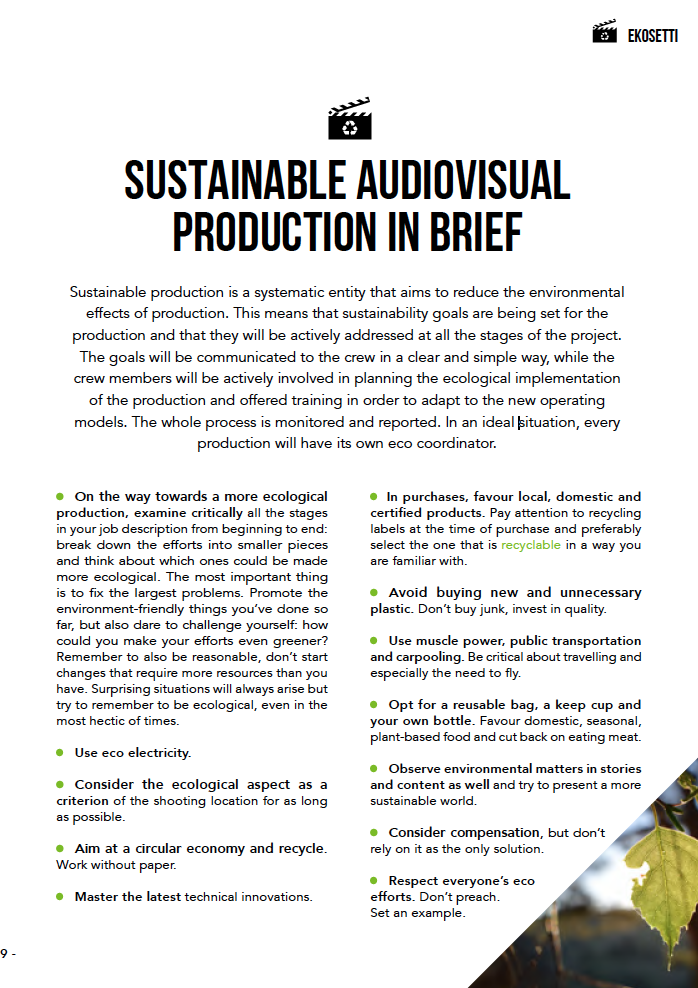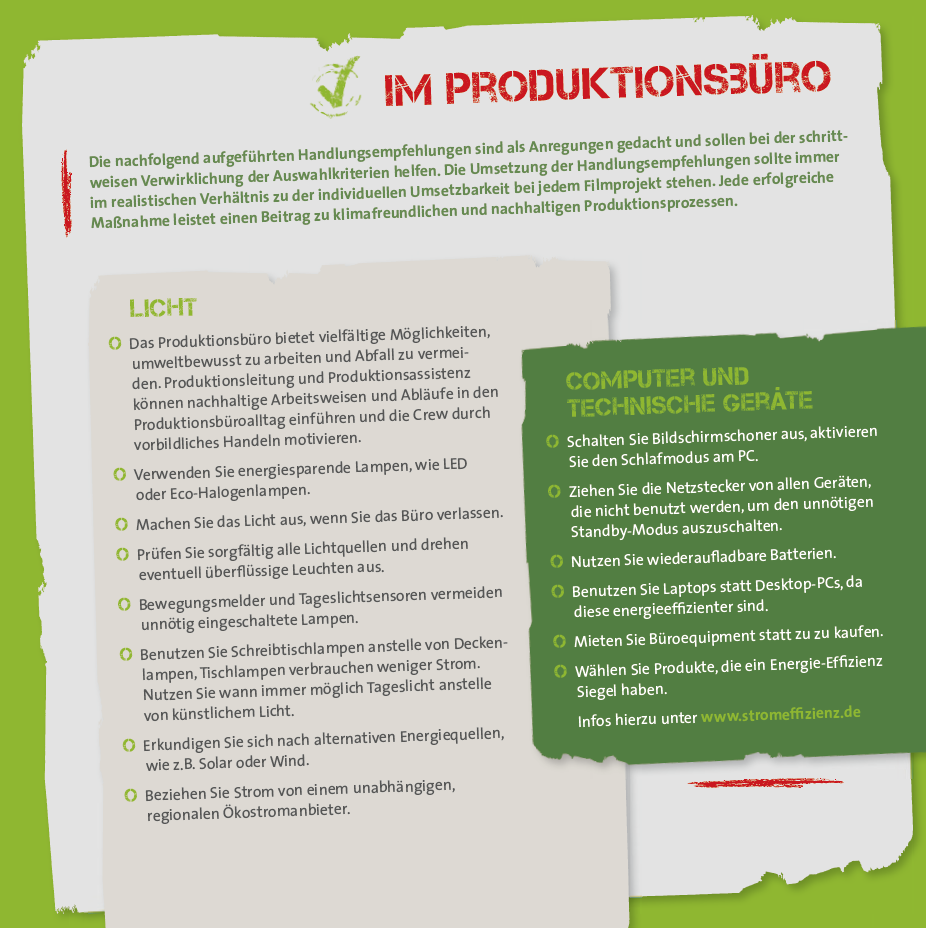Sustainable Initiatives in Film Production
There is already a very great initiative for the media industry, especially for film production. Green Film Shooting offers the media industry a platform to inform itself worldwide about approaches for sustainable business. These range from green-produced cinema and TV films, series, commercials and broadcast technologies to energy-efficient cinemas, smart IT management and even recyclable DVD packaging without harmful solvents. According to a study by the European Broadcast Union (EBU), two percent of all global CO2 emissions are caused by information and communication technologies.
The Green Film Shooting Initiative sees itself on the one hand as a forum, in which committed media professionals can exchange views on sustainable action, thereby discovering new approaches and sharing experiences. The measures, models and methods are very different. The initiative aims to provide guidelines on how to make film productions and their entire organization sustainable.
Best practice examples of encouraging green film production:
- EKOSETTI – A guidebook to sustainable audiovisual production in Finland
The Ekosetti guidebook was originally written for the Finnish audiovisual industry from a domestic perspective. With its translation also English-speaking audiovisual professionals in Finland should be reached, as well as those international partners, who wish to gain more information about the current sustainability efforts in the Finnish audiovisual industry. The purpose of this guidebook is to initiate the discussion on a new type of operating culture, where sustainability is included in decision making and practical work and highlights the perspective of environmental sustainability. The guidebook aims to serve everyone in the audiovisual industry, including stakeholders in advertisements, films, TV shows, studios, equipment rentals, producers, employees, commissioners, sponsors and partners. The goal is to provide information and inspire the whole field to improve their operations towards an environmentally friendlier direction, so it provides information about an environmentally friendly production in the fields of advanced planning, production management over how someone can motivate and be motivated to waste management, energy consumption, travel and logistics and much more. Each step of an audiovisual production was considered how it could be designed in a sustainable way.

Conclusion of this guide: The audiovisual industry requires pilot models for an environmentally friendlier operating, which have to be tested before they can be considered reliable. How to make this piloting possible, is a challenge — timewise and financially — for the entire industry, all the way from production companies to commissioners, funders and distributors. For this change, also regional film commissions, municipalities and cities are asked to contribute something, so it means, there has to be local support. But above all, the entire production team must be prepared to change its working methods to a sustainable form, because change always starts within the individual. It needs additional resources “behind the camera”, like environmental trainings, research and especially funding and extra time. The Ekosetti guidebook is meant to be updated and expanded, as the Finnish audiovisual industry evolves towards more sustainable operation models.
2. Grüner Drehpass | Green Filmpass – vermeiden, verringern, verwerten
Since 2012, the film funding of Hamburg Schleswig-Holstein has been campaigning for an ecological and sustainable rethink in the film industry with the Green Filmpass. Their Best Practice Guide helps film and television producers to deal with environmentally friendly and sustainable alternatives to the common practice on set and to include them in their planning. Among other things, it provides valuable tips on how to avoid waste, reduce energy consumption and recycle materials. The Best Practice Guide is intended to motivate and support the practical work as a guideline and checklist.
The Filmpass is designed in the manner of a checklist, which takes into account all the individual areas of a film production. In detail, it covers the preparation of a production as well as individual areas of the production office such as lighting, technical equipment, heating and air condition, office supplies, kitchen, waste avoidance, and cleaning, as well as “on location”-areas such as transport, fuel consumption, logistics, costume and make-up, lighting and camera. Equally, however, areas of equipment and set design such as props, materials and colors, as well as catering and post-production were also taken into consideration. The Best Practice Guide gives recommendations for action in all these areas, which should serve as a practical aid for getting started in environmentally conscious action on set.
3. The Green Film Initiative
The Green Film Initiative was created in 2012 from a research project of the Climate Media Factory, with the two pillars Potsdam Institute for Climate Impact Research (PIK) and University for Film and Television “Konrad Wolf” (HFF). The Climate Media Factory supported by the Federal Ministry of Education and Research is behind the founding of the Green Film Initiative and promotes sustainable film productions and supports producers, film promoters and market participants on the way to achieving this. This Initiative played a key role in initiating the topic of sustainable film production in the German film industry and since then has continuously promoted dialogue, knowledge exchange, understanding and support for the topic in a variety of ways. The GFI has also conveyed the topic, solution approaches and many practical tips in training courses, workshops, seminars, panels and keynotes – at the Hamburg Film Festival, in Cannes, Amsterdam, at EU level and overseas. So, it has thus made a major contribution to network international players and to promote the exchange of knowledge and understanding of international guidelines.
The special thing about GFI is, it networks Filmmakers who want to produce films more sustainably or are already doing so, climate scientists, experts from existing initiatives and activists in the various trades as well as film sponsors, film commissions, legislators and market participants. The public starting point of this initiative was the panel “Greening the Film Industry” at the Berlinale Talent Campus 2012 to support filmmakers on their way to more sustainable production. The initiative believes that the film industry can make an important contribution to achieve the goals to limit global warming.
Finally I would like to refer to the following Tedx talk from Birgit Heidsiek, Founder of the European Center for Sustainability in the Media World, who shared her ideas how films can be produced in a more environmental-friendly way.

